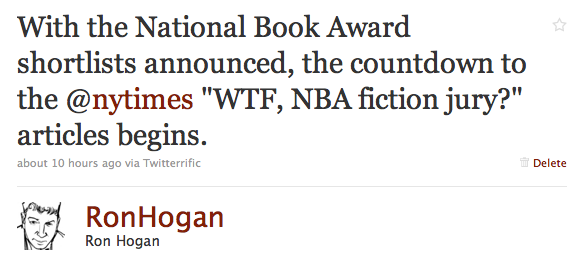The National Book Award Backlash Begins!
It’s always amusing to watch the would-be literary gatekeepers turn brittle whenever the rest of us refuse to rubber-stamp their pronouncements on what is and is not worthy of attention—we saw it a few months ago with the backlash against franzenfreude (the snotty remarks about Jennifer Weiner’s inability to construct compound German nouns were particularly amusing), and I expect we’ll see some more of it as the reaction to this year’s National Book Awards finalists, particularly those on the fiction shortlist, bubbles to the surface.

The sense of outrage at the NY Times over the National Book Awards fiction shortlist of 2004 was particularly vehement, with multiple articles devoted to explaining to Times readers why the five novelists on the award’s selection committee were out of step with what was truly significant in American letters that year. (Rick Moody, who chaired that jury, wound up writing about the situation for The Believer.) And I expected, when this year’s nominees were announced earlier today, that we’d see similar protests soon enough. I should have taken the growth of social media over the last six years into account: Laura Miller, who wrote one of the putdowns of 2004’s nominees, tweeted within an hour of the National Book Foundation’s announcements that the fiction shortlist was “pretty whacked,” adding: “I rest my case on all-novelist juries.” What, you might ask, did she mean by that?
One of the ways in which Miller attacked the NBA fiction shortlist of 2004 was to observe that the selection committee was, as it always is, composed entirely of fiction writers, “who feel they know all too well how easily good books go unnoticed” and “see it as an honor given to a writer by other writers, and apply very writerly, if not downright esoteric, criteria in making their decision.” In her version of events, the shortlist becomes not a validation of the surely good work that book reviewers like herself had spent the last year doing but “an especially emphatic thumbed nose in the direction of the literary establishment,” a declaration that what she and her colleagues were actually doing was “wasting time and column inches on safe big-name talents and inferior crowd pleasers.”
To which I honestly have little more to add than, “Well, all right then! And more power to them.”
Are Peter Carey, Lionel Shriver, Nicole Krauss, Jaimy Gordon, and Karen Tei Yamashita the National Book Award finalists I would have picked? I haven’t read any of the novels by those five authors yet (though I’ll get on it), and though I’ve read several novels I’ve truly admired—including Julie Orringer’s The Invisible Bridge, Lauren Grodstein’s A Friend of the Family, and Cory Doctorow’s For the Win—I’m not a fabulously well-read person; I certainly haven’t read anywhere near as many books as the NBA judges (Joanna Scott, Andrei Codrescu, Samuel R. Delany, Sabina Murray, and Carolyn See) have. (And I strongly suspect Laura Miller hasn’t, either, especially since I imagine she probably spent some time reading non-American authors, but maybe I’m wrong on one or both counts.)
So I’m willing to admit, first off, that I don’t know everything about this field—and, later, if we get to the point where I might actually wonder why this book and not that book?, as people are already doing with authors like Jonathan Franzen, Jennifer Egan, and Karl Marlantes, I’m going to go out on a limb and suggest that my aesthetic values are not, in fact, universal principles, and that somebody might construct a list of excellent fiction, based on their own criteria and sharing little if any overlap with my own selections, without it being “pretty whacked.” (The arrogance and condescension of that dismissal… as I say, it’s fun to watch the gatekeepers turn brittle when you push back on them.)
So no, this isn’t the shortlist I would have picked. I’m hoping, though, that it’s a shortlist I will come to appreciate, even if the time comes that I disagree with it.
POSTSCRIPT: For anybody who thinks it’s unfair of me to evaluate Miller’s current position by something she wrote in 2004, she spoke to the Los Angeles Times today: “People who write literary fiction tend to be in a kind of insular world that they believe is the whole culture, when it’s just a tiny province. And novelists tend to use the awards to correct what they feel are injustices, which becomes more important than helping readers find the exceptional book of the year.” Which still sounds to me like she’s trying to understand why five obviously intelligent people won’t validate her opinions.
13 October 2010 | theory |

 Our Endless and Proper Work is my new book with Belt Publishing about starting (and sticking to) a productive writing practice.
Our Endless and Proper Work is my new book with Belt Publishing about starting (and sticking to) a productive writing practice. 
